On July 10, 2024, the National University of Life and Environmental Sciences of Ukraine hosted the first roundtable of the PROGRESS Local Partners Coordination Group, co-organized and actively participated by scientists from the Institute for Economics and Forecasting of the NAS of Ukraine. The event brought together representatives of the project consortium, the Ministry of Agrarian Policy and Food of Ukraine, the Ministry of Environmental Protection and Natural Resources of Ukraine, as well as national and international organizations, agricultural associations, universities, research and professional institutions.
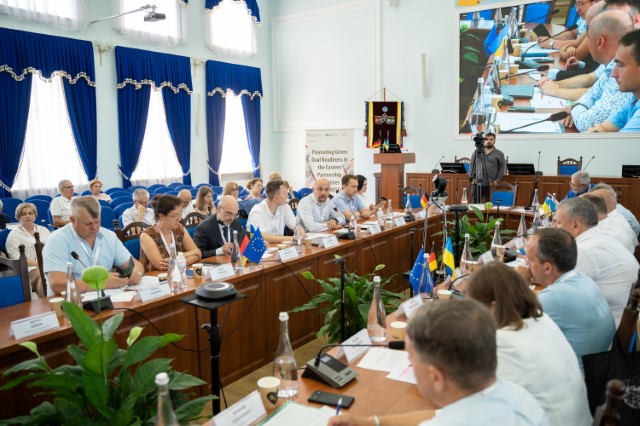 |
The regional project Promoting Green Deal Readiness in the Eastern Partnership Countries (PROGRESS) is one of the new initiatives of the Energy and Climate Cluster of the German Society for International Cooperation (GIZ), aimed at mitigating climate change impacts, fostering adaptation, and ensuring sustainable development in Eastern Partnership countries (Azerbaijan, Armenia, Georgia, Moldova, and Ukraine). Funded by the German Federal Ministry for the Environment, Nature Conservation, Nuclear Safety and Consumer Protection (BMUV), the project will be implemented during 2024–2028. In Ukraine, the project is being implemented by a consortium of organizations, including GIZ, the Organization for Economic Cooperation and Development (OECD), and the Institute for Economics and Forecasting of the NAS of Ukraine.
Martina Kolb, Program Director of the PROGRESS project, noted that, given Ukraine's accession negotiations with the EU, the project should support implementing all necessary requirements in the agricultural sector. Stakeholders from various groups are collaborating with the aim of strengthening the resilience and adaptation of the Ukrainian agricultural sector to climate risks.
Representatives of the GIZ Kyiv – project manager Dmytro Berezovsky and project advisor Artem Sadov – delivered a presentation on the historical background, features, and plans for implementing the PROGRESS project. OECD representatives Krzysztof Michalak, Isabella Neuweg, Olga Olson, and Nelly Petkova assessed the state of Ukraine's agricultural policy in light of climate risks.
The Institute for Economics and Forecasting of the NAS of Ukraine has involved many scientists in the PROGRESS project, including staff from the Sub-department of sectoral markets and the Sub-department of energy sector development and projections of the Department of sectoral forecasts and market conjuncture, the Department of forms and methods of management in the agri-food complex and the Department of monetary relations.
Representatives of the Institute's working group reported on their main activities within the project, on promising climate-resilient practices in the agri-food sector, on standards for good agricultural and environmental conditions, and on current policies and practices in the field of green agricultural finance. According to Oleksandr Diachuk, PhD, the head of the working group from the Institute, a leading researcher at the Sub-department of energy sector development and projections of the Department of sectoral forecasts and market, although today the biggest challenge and threat to our country is a full–scale war, climate change should be put in second place, as it poses significant short– and long–term threats, whose negative consequences cannot be quickly mitigated. Therefore, despite the war, the PROGRESS project is extremely relevant for Ukraine, its farmers, businesses, and citizens. ‘Thanks to the governments of Germany and Ukraine, as well as our partners at various levels, we can spread the best practices and methods of adapting agriculture to the effects of climate change throughout the country,’ Oleksandr Diachuk noted.
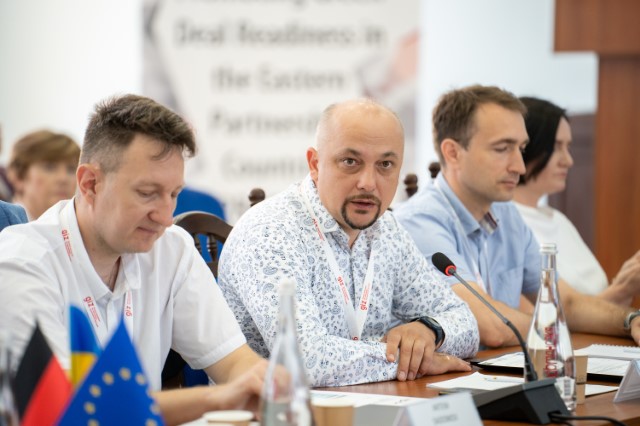 Oleksandr Dyachuk, PhD (Engin.), speaks |
Olena Shubravska, Doctor of Economics, professor, head of the Department of forms and methods of management in the agri-food complex of the Institute for Economics and Forecasting of the NAS of Ukraine, noted that adapting agriculture to the negative impact of climate change involves primarily maintaining soil fertility, economical consumption of water resources, and conservation of biodiversity. The EU pays great attention to implementing climate-resilient practices, and their application involves mandatory conditions that are the basis for financing European farmers. It is obvious that such an approach should become a guideline for Ukraine as well. Reorientation to environmentally friendly and climate-resilient agri-food production is one of the key factors in ensuring its long-term sustainability, as well as a significant sign of the Ukrainian agricultural sector's compliance with the EU's requirements during integration.
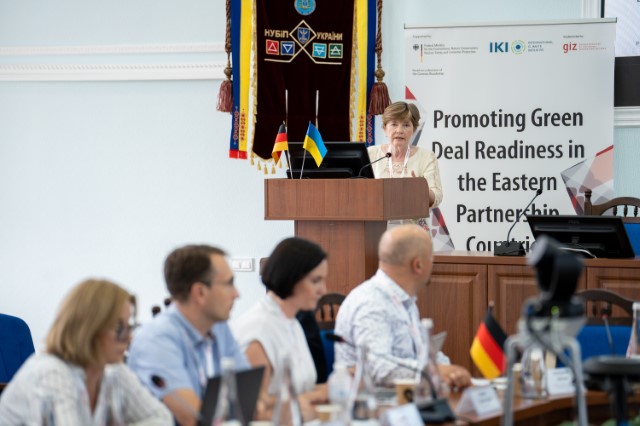 Olena Shubravska, Doctor of Economics, professor, speaks |
Tamara Ostashko, chief researcher at the Institute for Economics and Forecasting of the NAS of Ukraine, corresponding member of the National Academy of Agrarian Sciences of Ukraine, referred to the climate-resilient practices of greenhouse fruit and berry growing in the EU, emphasizing the feasibility of their implementation in Ukraine. The scientist noted that innovative greenhouse fruit and berry growing practices such as intelligent irrigation systems, aeroponics, use of renewable energy sources for heating, etc. reduce the carbon footprint of greenhouse products, the impact of external climatic conditions and the use of pesticides, and increase the efficiency of water, fertilizers and other resources.
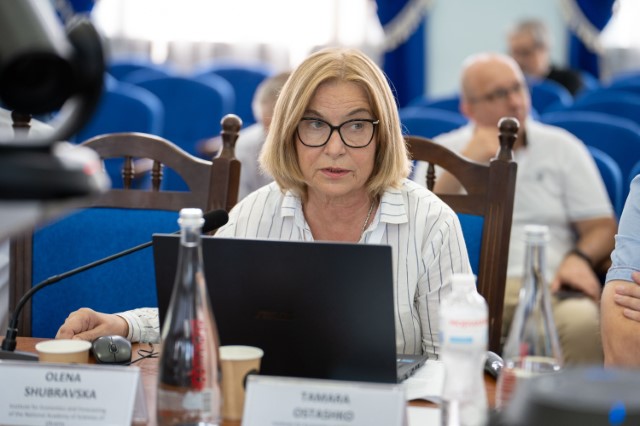 Tamara Ostashko, Corresponding member of the National Academy of Agrarian Sciences of Ukraine, speaks |
The use of ‘green finance’ (i.e., financial instruments used to implement investment projects aimed at improving environmental and climate resilience) simultaneously opens up additional opportunities not only for participation in environmental protection but also for strengthening the competitiveness of the entire economy and individual businesses, indicated Yevhen Bublyk, Doctor of Economics, head of the Department of monetary relations at the Institute for Economics and Forecasting of the NAS of Ukraine. The scientist emphasized that to promote the implementation of the Sustainable Development Goals (SDGs), adaptation to climate challenges and the requirements of European integration, as well as the prospects for access to vast amounts of relevant funds, the spread of green finance combines the interests of the main participants in the agricultural sector – from government authorities and financial intermediaries to farmers and gardeners.
 Yevhen Bublyk, Doctor of Economics, speaks |
Representatives of central and local authorities, government agencies, research institutes and educational institutions, agribusiness and the financial sector joined the discussion on the roundtable topic. Among the speakers were Vadym Tkachuk, Doctor of Economics, professor, rector of the National University of Life and Environmental Sciences of Ukraine, Serhii Kvasha, academician of the NAS of Ukraine, vice-rector of the University, and Oleg Prykhodko, chairman of the board of the Partial credit guarantee fund in agriculture.
Other researchers from the Institute for Economics and Forecasting of the NAS of Ukraine also participated in the round table: Vitaliy Venger, Doctor of Economics, head of the Department of sectoral forecasts and market conjuncture; Roman Podoliets, PhD, head of the Sub-department of energy sector development and projections of the Department of the sectoral forecasting and market conditions; Olha Popova, Doctor of Economics, chief researcher at the Department of forms and methods of management in the agri-food complex; Svitlana Brus, PhD, leading researcher at the Department of monetary relations; Volodymyr Olefir, PhD, leading researcher at the Sub-department of sectoral markets of the Department of sectoral forecasting and market conditions; Kateryna Prokopenko, PhD, leading researcher at the Department of forms and methods of management in the agri-food complex; Halyna Trypolska, PhD, leading researcher at the Sub-department of energy sector development and projections of the Department of the sectoral forecasting and market conditions; Yuliia Shapoval, PhD, senior researcher at the Department of monetary relations; Tetiana Saprykyna and Andrii Semeniuk, junior researchers at the Sub-department of energy sector development and projections of the Department of the sectoral forecasting and market conditions; Valentyna Denysenko, leading engineer of scientific and technical information.
The participants of the meeting also discussed:
-
- national and EU policies on the adaptation of agriculture to climate change;
- green financing for the agricultural sector;
- EU best practices on climate change resilience in the agricultural sector;
- challenges in the agricultural sector in the context of climate change.
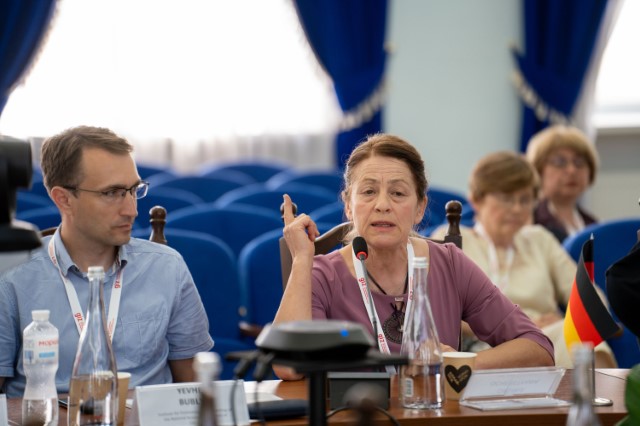 Olga Popova, Doctor of Economics, speaks |
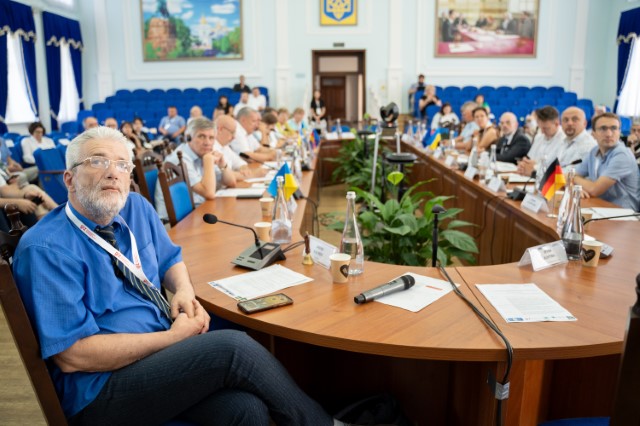 Andrii Kulykov – moderator of the event |
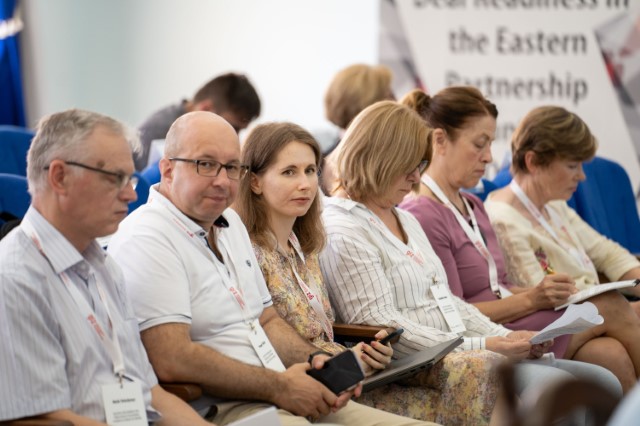 Staff of the Institute for Economics and Forecasting of the NAS of Ukraine |
Andrii Kravchenko, deputy director of the Department – head of the Division of the agriculture and crop production of the Department of the agricultural development of the Ministry of Agrarian Policy and Food of Ukraine, acknowledged the importance of foreign partners' assistance in this tough time for our country and, in particular, for the agricultural sector. The issue of green is quite complex; it is new for the Ministry, and therefore, there are new challenges. And now, it is vital not only to increase and maintain production but also to ensure the production of quality products that meet all the green requirements of the EU and other developed countries.
Mykhailo Chyzhenko, chief specialist at the Division of climate policy of the Department for industrial pollution prevention and climate policy of the Ministry of Environmental Protection and Natural Resources of Ukraine, nationally authorized representative of the UN framework convention on climate change on behalf of the Ministry, expressed gratitude for the systematic support that Germany provides to Ukraine in the formulation and implementation of climate policy, especially in adaptation to climate change, where such policy has only recently begun to take shape. He expressed hope that the PROGRESS project will help achieve progress in implementing the Strategy for the formation and implementation of state policy in the field of climate change until 2035, approved by Ukraine’s government on May 30 2014, which includes measures for climate change adaptation, namely, assessing the risks and vulnerabilities of agriculture to these changes and developing recommendations for climate policy in the agricultural sector.
The roundtable demonstrated the critical importance of international cooperation and exchange of experience for successfully implementing the European Green Deal in Ukraine and other Eastern Partnership countries.
 Participants of the roundtable |
According to the Institute for Economics and Forecasting of the NAS of Ukraine